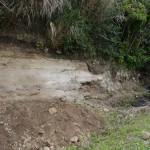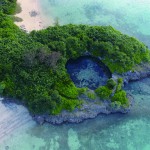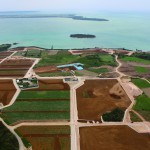【Designated by the City:Tangible Folk】Kusu-nu-ka
There is a Niri, or worship song about Kusu-nu-ka, sung during the Ueyan (ancestral worship festival) which has been celebrated at the Karimata settlement since long ago. The song mentions that Upugufutunu, said to have been the leader of the people at the time, had an idea to dig a water well. He spoke with his nephew and gathered the people of the village and they used iron-made equipment like Maitsu (hatchets) and Buna (broadaxes) to dig the Kusu-nu-ka. The people were delighted when good water started to flow abundantly and the whole village celebrated for three nights and four days. As can be understood from this song, it sings of the yearning and hopes of the people for water, during a time when water was scarce, along with how iron came to be handed down.
In addition, the Kusu-nu-ka is deeply related to the folk festivity of Karimata, called the Shitsu, when maidens enter the ocean in front of the Kusu-nu-ka together with their friends in the early hours of the morning on the day of the horse, or Kinoeuma, in May/June of the lunar calendar. The girls walk to the west and to the east in the ocean at chest-deep, singing the Aagu of the Shitsu. Then they come out of the sea at down and purify themselves by pouring the water of Kusu-nu-ka over themselves. This is what can be called the rite of emergence and renewal, the restoration of youth with the Bamizu, or the first water.
In this way, the Kusu-nu-ka was not only an important source of water in the ancient times, but it is an important spring that helps us understand the people’s rites and ceremonies of the Shitsu and Bamizu, and deeply related to the handing down of iron equipment and the history of the settlement.
≫View on a Google Map
 宮古島アプリの綾道(あやんつ)トップページ
宮古島アプリの綾道(あやんつ)トップページ 宮古島アプリの綾道(あやんつ)の内容
宮古島アプリの綾道(あやんつ)の内容 宮古島の3つのルート
宮古島の3つのルート 宮古島市長のあいさつ
宮古島市長のあいさつ 宮古島文化遺産紹介
宮古島文化遺産紹介








